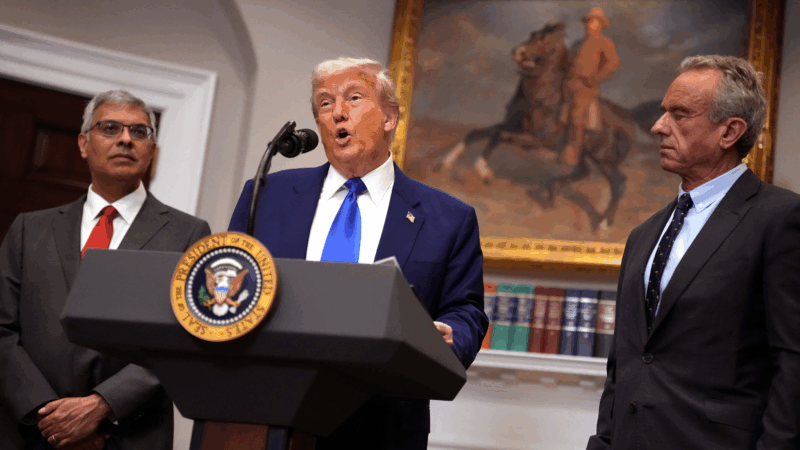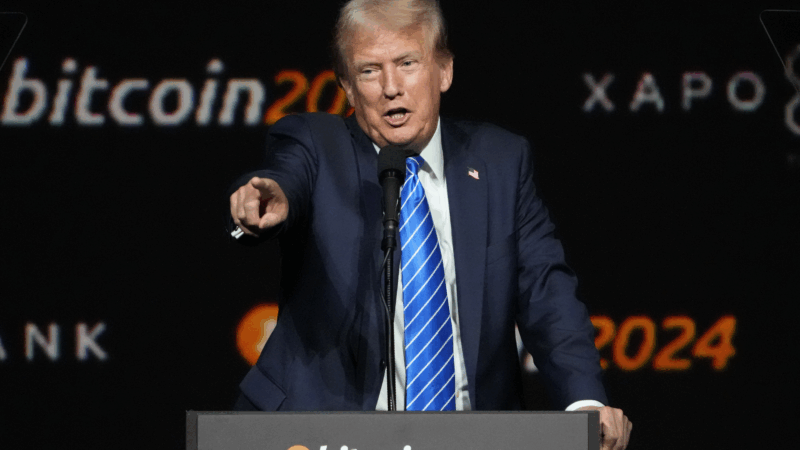Trump signs an order to reduce drug prices, but it’s unclear how it would work
President Trump is taking aim at U.S. drug prices with an executive order geared toward forcing drug companies to match the lower prices paid in other developed countries.
If drugmakers don’t do it voluntarily, the administration is threatening to directly tie drug prices paid by government programs like Medicare to those paid in other countries.
“Whoever is paying the lowest price, that’s the price that we’re going to get,” Trump said in an announcement at the White House, explaining what he called “most favored nation” pricing.
He said drugmakers would have to cut their U.S. prices to the level paid by other developed countries—or face consequences. “If necessary, we’ll investigate the drug companies, and we’ll, in particular, investigate the countries that are doing this,” he said. He also said that the U.S. market would be opened to imports from other countries.
Patients in the U.S. generally pay more for drugs than patients in other countries, largely because other countries have government health care systems that set prices they are willing to pay. The U.S., by and large, doesn’t set prices, so drug companies have more freedom to see what prices the market here will bear.
“We’ve been subsidizing other countries throughout the world” by paying higher prices, Trump said at the White House Monday, joined by leaders of federal health agencies.
The executive order lays out multiple approaches to lower prices
The new executive order has multiple parts. It directs the U.S. Trade Representative and Department of Commerce to take action against “unreasonable and discriminatory policies” that lower drug prices abroad, though it’s not clear what authority the White House has in this regard. It also directs Health and Human Services Secretary Robert F. Kennedy Jr. to facilitate direct–to-consumer sales that bypass health insurance at lower prices.
The order says that within 30 days the administration will give price targets to drugmakers “to bring prices for American patients in line with comparably developed nations.” The order lays out actions the administration would take if drugmakers don’t comply voluntarily, such as rulemaking to impose the prices. It’s unclear in the short term what legal authority the administration would have to enforce the order.
Trump said he doesn’t think the move would hurt drug companies’ ability to make money because they will put pressure on other countries to make up the difference by raising their prices. “Europe’s going to have to pay a little bit more,” Trump said. “The rest of the world is going to have to pay a little bit more, and America is going to pay a lot less.”
Trump teased the latest “most favored nation” price policy on Truth Social Sunday night, prompting the trade group Pharmaceutical Research and Manufacturers of America, or PhRMA, to come out against the executive order, calling it a “bad deal for American patients.”
After the executive order was announced, PhRMA president and CEO Steve Ubl said in a statement: “To lower costs for Americans, we need to address the real reasons U.S. prices are higher: foreign countries not paying their fair share and middlemen driving up prices for U.S. patients.” He added, “The Administration is right to use trade negotiations to force foreign governments to pay their fair share for medicines. U.S. patients should not foot the bill for global innovation.”
Most favored nation pricing was proposed before
Trump originally signed an executive order on most favored nation pricing in late 2020 during his first term that would have tied Medicare Part B drug prices to those in other countries. But the executive order faced court challenges and was ultimately dropped by the Biden administration. On the campaign trail last year, Trump said he would reinstate the most favored nation executive order from 2020, but a video about it disappeared from Trump’s 2024 campaign website.
Medicare began negotiating drug prices for the first time during the Biden administration in 2024, under new authority granted by the Inflation Reduction Act. The new lower Medicare prices for the first 10 drugs won’t go into effect until January 2026, but the discounts range from 79% for diabetes drug Januvia to 38% for blood cancer drug Imbruvica. Now, the Trump administration is negotiating the second batch of drug prices for 15 medicines in accordance with the law.
During the White House announcement, Dr. Mehmet Oz, who leads the Centers for Medicare and Medicaid Services under Trump, pointed out that even the lower negotiated Medicare prices are higher than what people pay in Europe for the same products. “Half the time we’re paying three times more than is paid in other countries. It doesn’t make any sense for the system.”
Oz says the new executive order will bring those prices down even further.
In this Icelandic drama, a couple quietly drifts apart
Icelandic director Hlynur Pálmason weaves scenes of quiet domestic life against the backdrop of an arresting landscape in his newest film.
After the Fall: How Olympic figure skaters soar after stumbling on the ice
Olympic figure skating is often seems to take athletes to the very edge of perfection, but even the greatest stumble and fall. How do they pull themselves together again on the biggest world stage? Toughness, poise and practice.
They’re cured of leprosy. Why do they still live in leprosy colonies?
Leprosy is one of the least contagious diseases around — and perhaps one of the most misunderstood. The colonies are relics of a not-too-distant past when those diagnosed with leprosy were exiled.
This season, ‘The Pitt’ is about what doesn’t happen in one day
The first season of The Pitt was about acute problems. The second is about chronic ones.
Lindsey Vonn is set to ski the Olympic downhill race with a torn ACL. How?
An ACL tear would keep almost any other athlete from competing -- but not Lindsey Vonn, the 41-year-old superstar skier who is determined to cap off an incredible comeback from retirement with one last shot at an Olympic medal.
Trump promised a crypto revolution. So why is bitcoin crashing?
Trump got elected promising to usher in a crypto revolution. More than a year later, bitcoin's price has come tumbling down. What happened?







